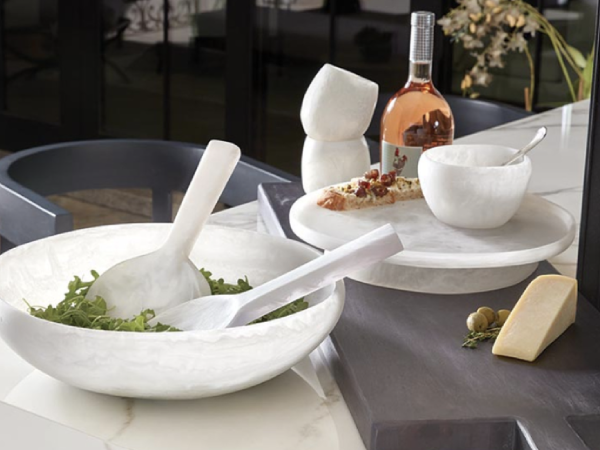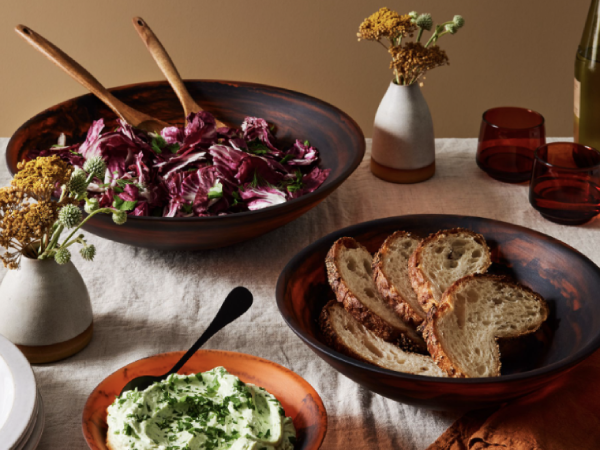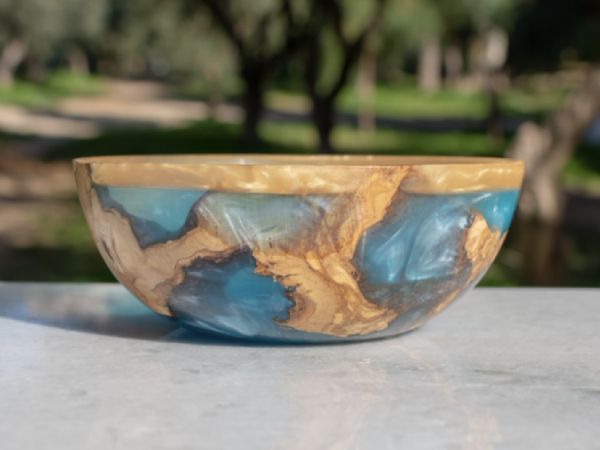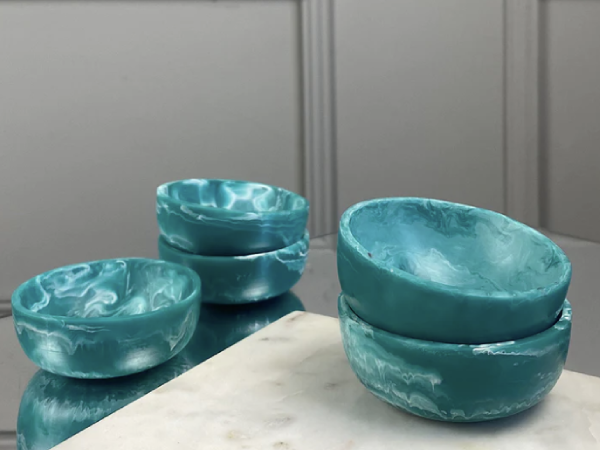
If you’re all about presentation and decoration when it comes to jazzing up your dining room, then you’re aware of the myriad options available for decorating the dinner table and beyond. Sure, we all have different notions of what looks great and what doesn’t, but one item that we can all agree is fundamental and universally appealing when it comes to setting the scene for a meal is the tableware.
But not just any kind of everyday tableware – it’s the one you make a statement with and practically have your guests gasp in awe when they see it. And that, my friends, is what charming and decorative resin salad bowls bring to the table. They’re uniquely shaped, colourful and durable – a carefully crafted amalgamation of beauty and utility that transcends the boundaries between art and function.
Why Opt for Resin Salad Bowls?

So why exactly should you go for these specific yet stylish bowls? How exactly are they different yet similar to other tableware? Given its long-standing presence in the industry, the resin is a material that brings a number of advantages in this scenario, including:
Captivating Colour Selection
If there was ever a full spectrum of colours within a single material, resin would be it. You can find just about any hue you put your mind to – ranging from solid, monochromatic hues to dazzling, rainbow-like patterns. As each bowl is individually crafted, you can also play around with multiple colour combinations that will look one-of-a-kind on your dinner table.
The material’s versatility comes from the way it’s produced. The process of making the bowls involves mixing pigments with resin, which then hardens and is polished to a glossy finish. This results in a surface that’s vibrant and incredibly easy on the eyes. Some of the abstract designs seem truly majestic, with irregular shapes and patterns that complement its already remarkable colour palette.
Durable and Customisable Nature
Unlike other materials, you don’t have to be extra careful when handling your resin salad bowls as their robust nature makes them resistant to everyday wear and tear. They’re unlikely to chip or break, even after extended periods of use.
This resilience lies in the molecular structure of the material, which binds together chemical compounds that make it impervious to external forces. The process involves adding a hardening agent into the resin mix, which facilitates the chemical reaction that gives it its unique and sturdy composition.
Food-Safe and Non-Porous Surface
When it comes to tableware, you don’t want to take any chances with the material used. Some options aren’t food-safe or can easily be contaminated if they’re not properly cleaned and stored. And even if they are, some tend to absorb odours and flavours from food, which can ultimately alter the taste of your meals.
Luckily, resin possesses a non-porous quality that prevents any odours or flavours from seeping through the surface. The inherent smoothness of the material also makes it incredibly easy to clean – a must when it comes to maintaining hygiene standards and prolonging its lifespan. Its food-safe properties come from the fact that it doesn’t contain any toxins or other harmful components, which means it’s suitable for food-related items.
What Types of Resin Bowls Are There?

Even among designer salad bowls, there is some variation in terms of composition and specific properties. Although all resin types keep their inherent qualities, they may differ slightly in terms of texture and overall finish.
Epoxy Resin
By far the most commonly used type, epoxy resin is a mix of two compounds – an epoxide and a polymer. The former is essentially what gives the material its adhesive properties, while the latter is responsible for giving it toughness and stability. When combined, the resulting material is incredibly easy to work with and can be moulded into just about any shape you desire.
Polyester Resin
Next up is a plastic-based material that’s slightly thicker when compared to epoxy. It’s derived from polyester molecules that are mixed with a catalytic agent, which then helps the material harden. It features more of a glossy finish and is incredibly resistant to corrosion. It feels quite lightweight but sturdy, with reinforced structural integrity and a greater level of flexibility.
Alumilite Resin
This is an interesting option as it is a combination of both the above-mentioned types of resin and is quite affordable when compared to other options. It has a higher viscosity, meaning it’s slightly thicker than other types and can be used for various applications. It also has a glossy finish that doesn’t discolour easily and is quite heat-resistant. As such, it’s a great choice for objects that may be exposed to the sun or other elements.
Tips for Properly Maintaining Your Resin Bowls

No matter the type of material used, it’s important to take proper care of your bowls in order to extend their lifespan. Sometimes, this may involve taking the extra step when cleaning them or even avoiding certain practices.
Recommended Cleaning Procedures
The best way to clean resin bowls is with plain water and mild soap. Gently scrubbing away any dirt or food particles with a soft sponge should do the trick. Avoid using harsh chemicals, heated water or abrasive materials as this may damage the surface.
Another great tip is to apply a food-safe sealant to your bowls every once in a while, which will help protect the material and keep it looking as good as new. These products consist of non-toxic components that act as a protective barrier against everyday damage and abrasions.
Best Storage Practices
Once all the food-related procedures are done, make sure to store your bowls in a dry place. Any prolonged contact with moisture can result in discolouration and even deformation. It’s best to keep them away from direct sunlight for long periods as this can cause the material to fade or become brittle over time.
When you’re putting them away, try to keep them from coming into contact with other objects. As much as the material is tough and resistant, it can still become scratched if not handled properly. This is especially true when it comes to stacking multiple bowls together, which often involves a certain degree of pressure that can cause damage.
Will you be treating yourself to a resin salad bowl this summer? Explore more kitchen trends below!
[caf_filter id=’10630′]
